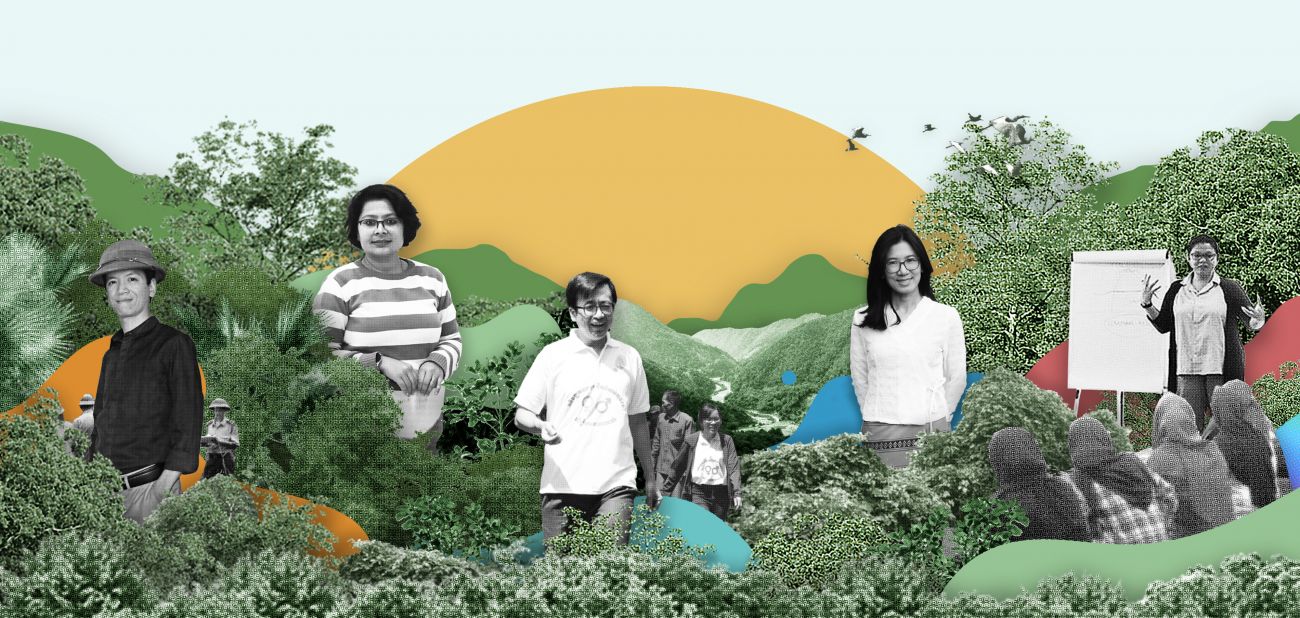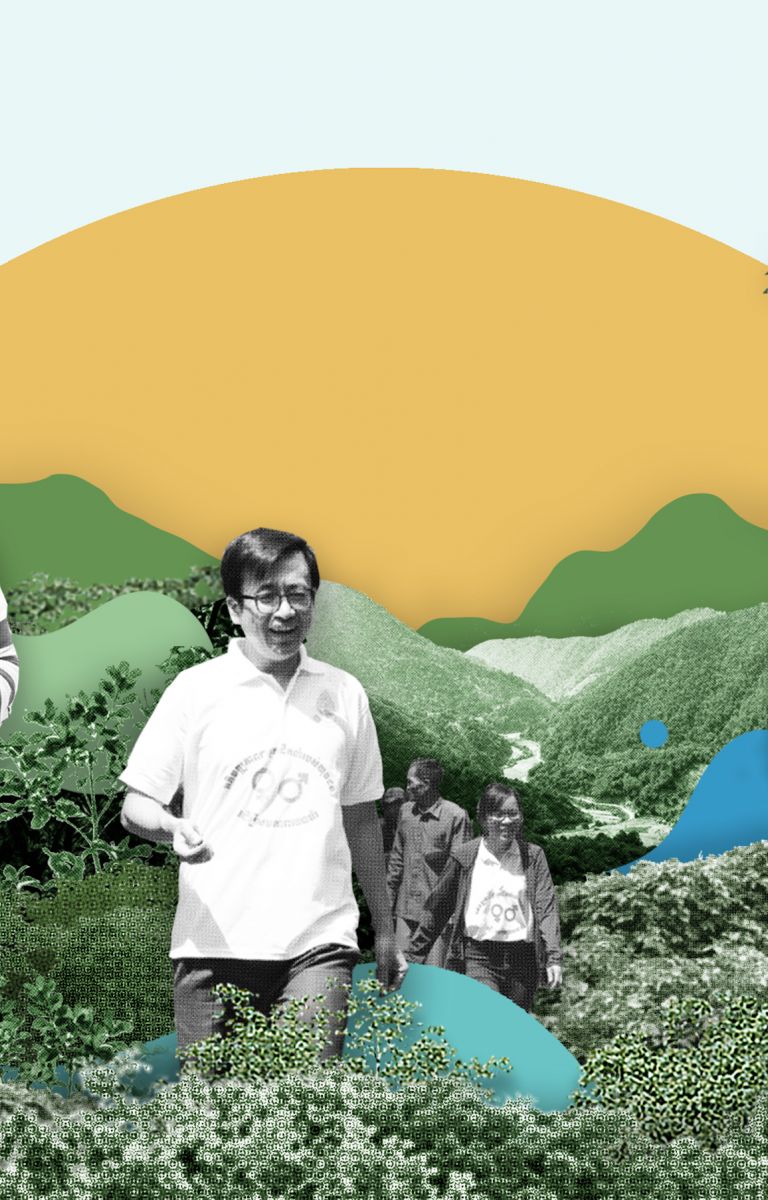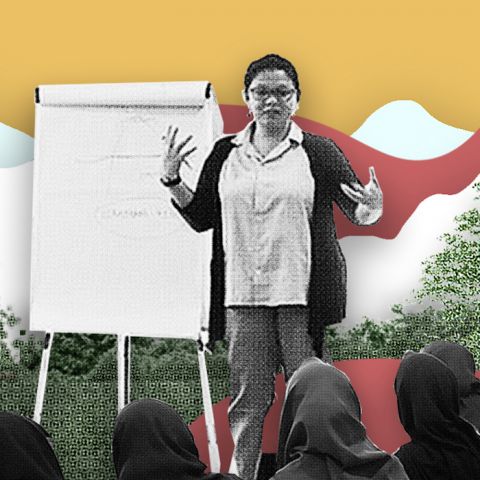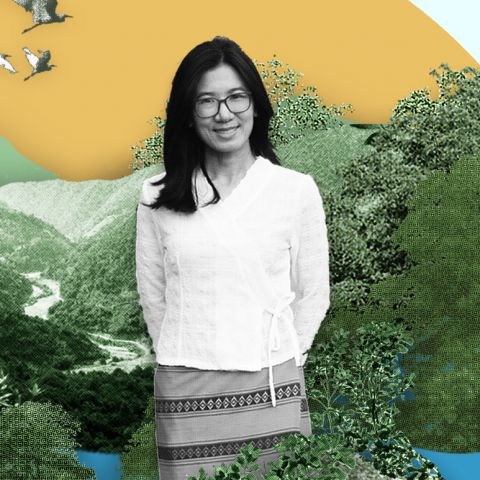

In 2019, before the COVID-19 pandemic hit the world, Mardha Tillah travelled to Bangkok for a workshop on gender leadership. At that time, she was the executive director of the RMI-Indonesian Institute for Forest and Environment.
“The initial discussions at the workshop focused on mindfulness and self-awareness,” says Tillah. “At first I didn’t understand how these topics related to leadership.”
But as the course progressed, a clarity began to emerge, and Tillah had what could be called an ‘aha moment’.
“I was so excited,” says Tillah. “The training emphasized the gendered self and looking inward to identify preconceptions of what it means to be male or female as the first step towards becoming a stronger leader. In those five days, I was thinking about other leaders having this kind of opportunity for enlightenment.”
She texted her colleagues, her mother and her husband: “If only we could organize this kind of session in Indonesia and experience this positive change.”
Riding the first WAVE
Tillah and the 30 other participants in the workshop were the first gender leaders in RECOFTC’s WAVES initiative. WAVES is shorthand for Weaving Leadership for Gender Equality.
The participants brought together diverse and broad experiences. They ranged from technical experts to high-level government officials from Cambodia, Indonesia, Lao PDR, Myanmar, Nepal, Thailand and Viet Nam. They also included government officers, politicians, academics, directors of civil society organizations, business managers and a journalist.
They were mostly women, but there were men as well. Some among them had ‘gender development’ in their job title or description. Others had heard the term ‘gender equality’ but knew little about it.
All the learners had policies, projects or ideas they wanted to launch that would create room for women to participate more equally with men in making decisions about the forest.
“They all wanted women to be recognized for the work they were already doing, and provide more opportunities for gaining first-hand exposure they would need to advise on policies,” says Kalpana Giri, a forester who leads the WAVES initiative at RECOFTC. “They wanted to hear what women in communities were thinking so they could reflect their interests in forest management plans and policies. They also wanted to recognize women’s roles in patrolling and protecting forests."
But despite their ambitions, the participants all faced obstacles that prevented them from achieving their goals.
Turning the tide
For 30 years, RECOFTC has worked to empower forest communities to manage and conserve the forests and wetlands they depend on to survive and thrive. In much of that work, men have made the decisions.
In the forestry and natural resource management sectors, national commitments to ensure gender equality had hit a kind of invisible wall, says Giri.
“No one says, ‘I don’t want to work on gender equality’”, she adds. “They say, ‘Yes, gender equality is very important, but there is zero budget to do this’.”
So Giri began to look for ways to break down that invisible wall.
First, she decided to throw one-off gender training out the window. WAVES became a three-year leadership and training network with technical, financial and psychosocial support.
Then, the WAVES approach drew inspiration from the relational leadership model, which emphasizes the relationships among people. Relational leadership values inclusion, empowerment, purposefulness, ethical behaviour and process orientation.

"The training emphasized the gendered self and looking inward to identify preconceptions of what it means to be male or female as the first step towards becoming a stronger leader."
Mardha Tillah
The workshop first focused on each individual’s personal growth. Participants learned to look inward and analyze their own biases. From there, they considered the societal conditioning of other people and how their biases are products of their socialization. Grasping these concepts led the gender leaders to change how they related to others.
The gender leaders have not changed their work. Instead, they have changed how they work. They became more multidimensional, they say, in how they carried out existing or planned programs.
Self-awareness triggers change
Follow-up interviews two years after the initial workshop found that the participants all left the course with a changed viewpoint on how to be a good gender leader. And they had a chance to put theory and learning into practice when they returned to their jobs in their home countries.
Tillah realized that looking inward should also apply to her organization. She mobilized her colleagues to formalize a gender policy that had been idle for years. They initiated a gender audit to see if their monitoring and evaluation tools used a gender perspective and if their programs were gender sensitive.
“Thankfully the audit showed that we were gender sensitive,” says Tillah. “We got a good score, but with notes and marks to improve.”
Over time, she discovered how challenging it was to reverse deep-rooted practices, such as male village leaders speaking for women or male youths monopolizing training opportunities in indigenous communities.
This recognition prompted Tillah and her team to draft guidelines specifying that field teams must have one male and one female facilitator. Female facilitators would lead women-only group discussions.

“The team set up a cooperative for women when female village residents were denied training opportunities,” says Tillah. “We now have young indigenous women actively participating in the youth group we work with. The young women initiated collective gardens where they grow vegetables for their consumption.”
Once back in Myanmar, Khin Nyein Khan Mon thought about why the training had opened with self-awareness. And then, she too, had her ‘aha moment’.
“Women in my country and in my workplace are treated unequally,” says Mon, a technical specialist with the Myanmar Environment Rehabilitation-conservation Network. “But we don't know it. We accept it. We think it's normal. We think it’s ordinary. But actually, it is not normal, it is not ordinary. So, we need to understand that first. If we don’t understand that, how can we work for equality?"
Breaking down barriers
Deepa Oli, a forester and the focal point for the Gender Development Unit in Nepal’s Ministry of Forests and Environment, also left that first workshop with a dramatically changed perspective. She went back to her work with an expanded understanding, and expanded vocabulary to match, of the barriers that had been frustrating her for too long. Two years after the workshop was over, she says it taught her how to handle discrimination and bias more constructively than with anger.
And that, she says, has made all the difference.
“Those first days with WAVES taught us how to self-assess the deep imprints of social norms and values in our thought processes,” Oli says. “We learned how to be ourselves, to love ourselves, to embrace ourselves. It’s something I will never forget. This message is so touching for me. It inspires me to work. I can value myself and thus value other people.”
 Oli also talked about her understanding of the term ‘socialization process’, which she had never heard before the course. She came to realize that it was what she and other gender equality activists ultimately were up against: The people who resisted her ideas or challenged her were products of their upbringing and the socialization process.
Oli also talked about her understanding of the term ‘socialization process’, which she had never heard before the course. She came to realize that it was what she and other gender equality activists ultimately were up against: The people who resisted her ideas or challenged her were products of their upbringing and the socialization process.
This new awareness changed how she interacted with anyone who worried that talking about gender would create competition between men and women.
“I hit at the barriers instead of at the person,” she says of people who questioned her intentions on gender equality issues. “Being calmer and composed is doing the same thing a different way. It is confronting in a strategic manner. When I reacted immediately, the resistance was too high. Now I do the same thing a different way. And people now hear what I am saying.”
Vocabulary matters
Oli spoke of a movement within Nepal’s forestry sector to overcome inequalities, sexual harassment and other abuses that are barriers to women exercising their leadership.
“We knew there was something lacking to create safe and dignified workplaces, but we were unable to identify the way to deal with it,” says Oli. “WAVES gave us the vocabulary to describe the whole process, which then helped us to reframe our narrative and find a strategy to move forward.”
The Ministry of Forests and Environment’s gender-sensitizing training introduced foresters to the concept of socialization.
“We showed them that the way individuals think is not ‘your fault’ or ‘my fault’. It is our socialization process. Everyone, both men and women, are now listening and agreeing with what we are saying.”
She says the female foresters network in Nepal now directs its attention to four priorities: enhancing leadership capacity, creating safe and dignified workplaces, making gender mainstreaming a core business in their sector and establishing more male allies.
The female foresters network added a training component on sexual harassment. It includes an analysis of the spectrum of harassment to help people make distinctions between rudeness and abuse. This helped speed the process of change.
“Women foresters began reporting incidents of sexual harassment because the historical tolerance had finally shifted,” Oli says. “This is a major change we can see for ourselves.”
Men as gender leaders
“Women work in forestry? Women patrol in the forest? Come on!”
Mai Quang Huy heard plenty of unfair comments and jokes about women as he rose to the directorship of Phong Dien Forestry, a company that produces and trades timber, resin, forest seedlings and herbs in Viet Nam. He always felt his colleagues’ and clients’ prejudices about the roles and responsibilities of women in forestry were wrong.
 Since joining WAVES, Huy has directed his company to follow gender-sensitive policies, eliminate gendered division of labour and include gender analysis in annual reports. His company now requires that women are included in community meetings and that contracts include the names of both wives and husbands.
Since joining WAVES, Huy has directed his company to follow gender-sensitive policies, eliminate gendered division of labour and include gender analysis in annual reports. His company now requires that women are included in community meetings and that contracts include the names of both wives and husbands.
“My peers and colleagues asked me why I was interested in gender issues and why I did not focus on forest encroachment or forest fire prevention and control,” Huy says. “I responded that gender issues are a root cause of these problems and solving gender issues helps to address them."
In his early days as a gender activist, The Chhun Hak talked about women’s rights, the global United Nations agenda and national pressure to follow through on global commitments. Today, he is the director general for the Gender Equality and Economic Development division within Cambodia’s Ministry of Women’s Affairs.
WAVES, he says, taught him to focus on building mutually beneficial partnerships.
“My way of working with stakeholders seems better,” Hak says. “I learned how to build a partnership and that it is about the long term. It’s about how to bring everyone together to share a common goal.”
Instilling awareness in young people
The initial self-awareness training also deeply affected Hak. WAVES taught him to be “transformative,” he says. He realized that a fundamental shift could be achieved if young people learned about equality and leadership before they became leaders.
In 2020, Hak initiated the Youth Leadership Lab for Gender Equality, which included self-awareness topics. The Lab is now a one-year coaching program for cultivating leadership and gender equality among youth. Young people make proposals for research or community empowerment and receive help to fund and conduct their work.
He also established a leadership campaign within the Ministry of Women’s Affairs to attract and invigorate the junior ranks.
“It has created a dynamic image of the Ministry among students and young people who now seek employment there,” he says. “They are inspired because they can see that gender equality is not just a narrow understanding of women’s issues, but something broader that leads to making real change for their society.”
 Tillah also introduced new programs for young people when she returned to her Indonesian institute after the first WAVES workshop. She created a module on mindfulness, stereotyping and biases in the short course for forestry students, junior and high school students and young people in rural areas.
Tillah also introduced new programs for young people when she returned to her Indonesian institute after the first WAVES workshop. She created a module on mindfulness, stereotyping and biases in the short course for forestry students, junior and high school students and young people in rural areas.
“The responses from participants during the course indicated that they have biases and stereotypes that are very relevant to everyone,” she says. “They valued the training and space to understand gender-based inequality that the course offered.”
Personal support builds confidence
The WAVES program is comprehensive. It offers three years and more of training, technical assistance and limited funding for projects that gender leaders want to pursue. WAVES also established a focal point in each of the seven countries to check in with the gender leaders either with group chats or one-on-one conversations.
If patterns emerged during the monthly focal points reporting at online meetings with Giri, she would set up virtual trainings to respond to the arising needs. Giri often engaged in the group chats and opened her door to each gender leader.
“This made us feel we are not alone,” says Hak. “It’s not a big investment but it’s a big support for us. It gives us more confidence to know that somebody has our back.”
The psychosocial support was not engineered into the program design, admits Giri. “We provided a safe space for reflection in response to a need we recognized,” Giri says. “If the gender leaders were not achieving the targets of their projects, we’d say ‘Okay what happened, tell us your story’. In the chats or reflection sessions, when they came and told stories, the barriers they reported were not limited to the technical part. They were saying when this happened, they were broken. They were ready to quit.”
Ripples build future waves
After the first WAVES training, participants felt empowered to make changes, even smaller ones that could have a big impact now and in the future.
For example, one gender leader in Indonesia changed the stipulation that pregnant women could not attend training and set up a day-care facility for trainees’ children. Another integrated gender issues into her university’s forestry curriculum. In Cambodia, gender leaders influenced the gender action plan and strategy. In Nepal, they aim to cultivate 300 gender leaders in their field over the next two years through training, webinars and career counselling.
Perhaps most importantly, WAVES has helped give technical legitimacy to the term ‘gender equality’.

"Women in my country and in my workplace are treated unequally but we don't know it. We accept it. We think it's normal. We think it’s ordinary. But actually, it is not normal, it is not ordinary. So, we need to understand that first. If we don’t understand that, how can we work for equality?"
Khin Nyein Khan Mon
“It is no longer considered to be something everyone can do,” said independent evaluator Dibya Gurung at a recent online WAVES workshop. “It used to be common practice for anyone to give input on gender-related documents or platforms or events. Now organizers make sure that someone has knowledge or experience before they give input. That kind of legitimacy, that kind of value, is slowly being given.”
Giri agrees.
“Whenever I ask the Myanmar team what they have achieved through WAVES, they say ‘acceptance’. Previously, people were saying to them, ‘No, no, gender doesn’t matter. We do community forestry, it’s enough.’ Now, slowly, because of webinars they are doing, because of some assessments they are doing, because of making noise, people are hearing the messages. There is a connection.”
And gender leaders like Mon, she sees, are ready.
“She has figured out this is where she stands,” says Giri. “She will need more support to manage that resistance and make gender more integrated within the community forestry. But now she is like, ‘Okay, bring it on. I can take it’.”
###
The Weaving Leadership for Gender Equality (WAVES) initiative enhances leadership skills and supports the capacity of leaders to advocate for gender equality. RECOFTC implements WAVES with support from the Swedish International Development Cooperation Agency (Sida). For more information on WAVES visit this page.
RECOFTC's work is made possible with the continuous support of the Swiss Agency for Development and Cooperation (SDC) and the Swedish International Development Cooperation Agency (Sida).

